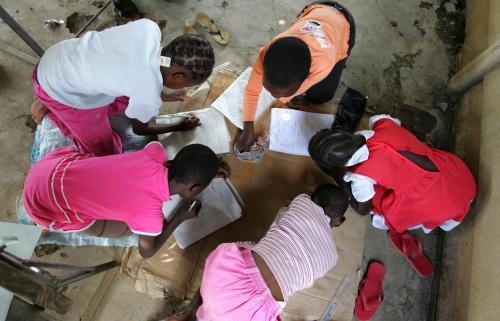In the early 1990s, Poland had one of the lowest participation rates of almost any industrialized country in secondary school and higher education. At the end of the decade, in 2000, the average student PISA score (an international testing program, Program for International Student Assessment) was 479. This was considered well below the OECD average of 500, and in reading and math Poland ranked 25 out of the 43 participating countries.
Starting in the late 1990s, Poland made some far-reaching changes. It gave students an additional year of secondary school before making them decide on an academic or vocational track. Poland started school a year earlier, with students beginning at age six rather than seven. And it implemented a new system of exams at the end of primary, lower secondary, and upper secondary school to monitor the progress of schools against set goals.
These changes had a tremendous impact. They led to smoother transitions into the labor force for Polish students, and also allowed for more equitable decision-making among students about whether to continue studying or enter vocational training tracks. PISA scores also dramatically improved, and by 2009 Poland ranked among the top 15 OECD countries, ranking ninth among all PISA countries in reading. Poland’s average reading level rose by the equivalent of children spending an additional half-year in school every year between 2000 and 2009, eventually reaching the same level of 15-year olds in the Midwest in the United States. And many more young people entered university, with 30 percent of Poles ages 25 to 34 holding degrees as of 2013.
Working on these reforms as they progressed was Zbigniew Marciniak, Poland’s undersecretary of state in the Ministry of National Education from 2007-2009 and in the Ministry of Science and Higher Education from 2010-2012. Marciniak is also an adviser to the Millions Learning project here at the Brookings Center for Universal Education. Following a recent meeting, I spoke with him about Poland’s success in education reform and how it may or may not be replicable throughout the world. Below are some excerpts from our discussion.
Jenny Perlman Robinson: What factors were particularly important in contributing to the huge gains in learning by Polish students after 2000?
Zbigniew Marciniak: Poland is quite a specific case of reform, because this was a special moment in our history. We were at the beginning of a new road toward a completely different social system, and the society was prepared to accept the quite deep changes that had to occur. So, that was one factor.
There was another factor that was quite important. In the new economic situation, when “unemployment” became an official word—it was forbidden in the communist days—parents started to think, “What is the way to secure a future for my kids?” Most of the families discovered that education was the right road because then you get a job and a more secure position. That’s why something incredible happened in Poland. Namely, that many, many parents decided their kids should go to study at the universities. In doing this, the number of students at the Polish universities increased fivefold since the 1990s.
JPR: How did this shift in mindset around the benefits of university affect the rest of the education system?
ZM: This social decision around [the importance of] universities, which was not inspired by any politician, was a key contributing force to changes in education. Once university was deemed important, other things followed. If you want to send your child to university, then your child should get good schooling. So, the school should improve. How should it improve? We should establish opportunities for one additional year of schooling. Next, we should define what the objectives are so that it’s clear what children should learn in this additional year. Then, we should implement national exams so that we check that they are ready for this kind of future, and so on.
Gradually, all of this was socially accepted. We were lucky in a sense. If the country doesn’t have this advantage, then it has to seek other ways of catalyzing this change. For example, in Poland, we also decided to lower the age of school enrollment from seven to six years old. Initially this was not socially accepted as it was seen as the parents’ decision [when children were ready for school]. It took four years before we finally implemented this, because there was a big discussion, a big opposition, and it was delayed for years. Eventually, the parents who could send their kids to school earlier did so.
Change depends very much on the social atmosphere, and we took advantage of this in Poland where there was a positive, supportive attitude towards change. In many ways, the reforms were not a result of the government making the wisest decisions to change this or that—it was the outcome of larger societal changes taking place in Poland at the time.
JPR: How was it possible that these reforms happened in such a short period of time?
ZM: I think that improving education is not a strong enough argument sometimes to convince people to accept profound change. But if you say that the economy will grow, and provide arguments for that, that it will be much easier for children in the labor market, or that there are possibilities of jobs and that foreign companies can give them work, this can convince people to accept change. This is not to say that reform is easy; in fact, it is often difficult as there are many stakeholders who can be affected by this change and may stand to lose.
But if the society as a whole thinks it’s a good idea to teach kids, then even opponents usually will come around as they are part of the larger society. If there isn’t agreement—if teachers don’t support it, if the minister doesn’t support it, etc.—then it is easier for opponents to say “no, it’s not a good change.” So, these are not easy changes, and maybe this should be made explicit. No reform that leads to significant changes in social life is an easy one.
You need good arguments, and these arguments should go outside of education. There are not too many people, I believe, who just would like education to be better, just for the sake of education. Today, this argument alone is not strong enough.









Commentary
The Importance of Societal Support in Reforming Poland’s Education System: A Discussion with Zbigniew Marciniak, Former Undersecretary of State for Poland
November 3, 2014